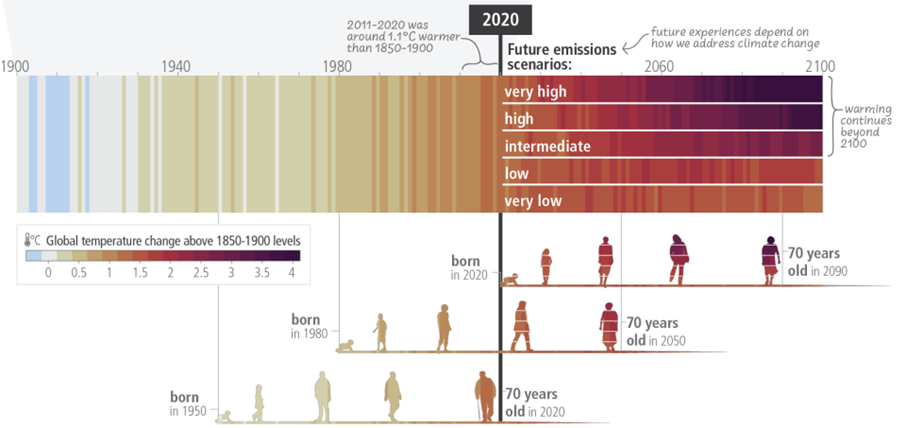The latest IPCC report
The most recent IPCC report reveals no news. As usual it is a summary of current research – and a grim reminder of how troublesome our situation is. The report also highlights some opportunities, not least the reduced price of renewable energy. This is not a small thing, but there are still several reasons why we should feel really worried: temperatures are now 1.1 degrees above pre-industrial times, and we need to immediately reduce our emissions if want to have even the slightest hope of staying beyond 1.5 degrees of warming.
The consequences of the global warming are already now obvious and include increased sea levels, water shortages and more extreme weather. There is still hope, but as the scenarios in the picture below (from the report) shows, we need to act – but even if we act we should also prepare for a warmer climate. Most businesses (if not all?) will be impacted, one way or the other.

Personally, I still believe that there is time for a green transition, and I think that this transition will entail both new technologies and new behaviour. But for the transition to take root – to be sustained – it will also have to be just. This brings us to…
Corporate due diligence for human rights and the Norwegian Transparency Act
Have you heard of the Norwegian Transparency act? Or Åbenhetsloven, as it is called in Norwegian. It’s an interesting piece of legislation that came into force in Norway July 2022, and applies to larger companies resident in or offering services or products in Norway. The act aims at promoting companies respect for (fundamental) human rights and decent working conditions. It further requires companies to carry out due diligence assessments and to disclose (publish) an account of their assessments.
The assessment shall be carried out in accordance with the OECD Guidelines for Multinational Enterprises, and is many ways similar to the proposed Corporate Sustainability Due Diligence Directive (which I touch upon in this previous Newsletter) – though I suspect that it will be some what less “heavy” for companies to report according to the Norwegian act than the CSDD in its current form.
“The Transparency Act requires enterprises to conduct due diligence assessments, meaning that they must look at both their own business, their supply chain and their business partners to find out where the biggest risks are”
(Section 4 of the Act)
The due diligence assessment shall cover the entire supply chain but, the act also stresses the principle of proportionality, meaning that context, severity and probability of any adverse impact should be taken into consideration. It is estimated that 9000 companies are directly bound by the act. The assessment mus be published (at least) on the companies website and the first dead-line is 30 June 2023. In addition, companies have a duty to provide information to anyone who requests to know how it addresses actual or potential adverse impacts.
Personally, I very much look forward to see how the act will unfold and what this may imply in terms of companies respect for human rights. I think it will fairly soon impact many more companies than those who are directly obliged to report in accordance with the act, and even companies outside Norway. It is also worth noting that there is similar legislation in force or being proposed in several countries, for example France, Germany and the Netherlands (Here is a link to an interesting chart/summary) and with CSDD being approved we will see similar legislation in all European countries.
Change is coming!
